Cost Increases for Scholarly Research Materials: Change, Challenge, and Potential
by Dawn Emsellem-Wichowski, director of library services
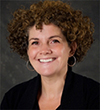 Rapidly rising costs in scholarly publishing are a financial challenge which impact the Salve Regina University community’s access to paid research resources such as the article databases, ebook collections, and ejournals available through McKillop Library. A rapidly evolving publishing environment, along with frugal budget allocations necessitated by a tumultuous landscape in higher education, has required contraction of McKillop Library’s materials budget and an on-going process of prioritization and evaluation of our research resources. The recent rise of open access publishing provides one potential alternative path forward.
Rapidly rising costs in scholarly publishing are a financial challenge which impact the Salve Regina University community’s access to paid research resources such as the article databases, ebook collections, and ejournals available through McKillop Library. A rapidly evolving publishing environment, along with frugal budget allocations necessitated by a tumultuous landscape in higher education, has required contraction of McKillop Library’s materials budget and an on-going process of prioritization and evaluation of our research resources. The recent rise of open access publishing provides one potential alternative path forward.
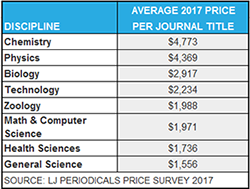 With average 5-8% cost increases per year for online research materials and decreasing materials budget lines, the library has worked to carefully reprioritize spending and to judiciously cancel some journal titles and databases. Usage statistics for our online resources are collected and analyzed once per year, and these statistics inform our decisions, along with faculty input and curriculum or program changes. Some funding has been moved from the book budget to cover increases in journals and databases. Eight databases have been cancelled since 2009. The average increase in database costs over the last 5 years is 17.68%. The journal Nature increased in cost by 111%. Due to these cost pressures, adding new journal subscriptions represent a trade-off in which some other resources usually will need to be reduced or cancelled.
With average 5-8% cost increases per year for online research materials and decreasing materials budget lines, the library has worked to carefully reprioritize spending and to judiciously cancel some journal titles and databases. Usage statistics for our online resources are collected and analyzed once per year, and these statistics inform our decisions, along with faculty input and curriculum or program changes. Some funding has been moved from the book budget to cover increases in journals and databases. Eight databases have been cancelled since 2009. The average increase in database costs over the last 5 years is 17.68%. The journal Nature increased in cost by 111%. Due to these cost pressures, adding new journal subscriptions represent a trade-off in which some other resources usually will need to be reduced or cancelled.
 Developing trends in publishing and scholarly communication may provide researchers with new means of research and scholarly discourse and help academic libraries cope with cost challenges. Among the most promising trend is the rise of open access publishing. This movement builds on the spirit of sharing and collaboration among libraries and academics. It combats the trend of universities funding academics to perform research, which is published in journals, which then sell the research back to university libraries at exorbitant cost. In the open access model, researchers work with libraries to provide access on the open web to raw data, preprints of articles, book chapters, and other products of research in digital formats. Authors might also contribute to open-access textbooks and promote their use in repositories such as the Open Textbook Library at University of Minnesota. Digital Commons is Salve’s open access repository, and we welcome submissions. As with all research in the current information environment, a high level of skill in research and evaluation is essential when utilizing open access materials. Librarians collaborate with faculty to help students develop the skills to thoughtfully navigate this environment. Developing trends in publishing and scholarly communication may provide researchers with new means of research and scholarly discourse and help academic libraries cope with cost challenges. Among the most promising trend is the rise of open access publishing. This movement builds on the spirit of sharing and collaboration among libraries and academics. It combats the trend of universities funding academics to perform research, which is published in journals, which then sell the research back to university libraries at exorbitant cost. In the open access model, researchers work with libraries to provide access on the open web to raw data, preprints of articles, book chapters, and other products of research in digital formats. Authors might also contribute to open-access textbooks and promote their use in repositories such as the Open Textbook Library at University of Minnesota. Digital Commons is Salve’s open access repository, and we welcome submissions. As with all research in the current information environment, a high level of skill in research and evaluation is essential when utilizing open access materials. Librarians collaborate with faculty to help students develop the skills to thoughtfully navigate this environment.

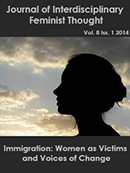 An offshoot of the open access movement is the development of centers for digital scholarship. In this model of library/faculty collaboration, librarians work with faculty to envision research projects that map, catalog, or make research interactive. Other scholars visit these spaces and create new conclusions from the data, building the scholarly record and allowing faculty at smaller institutions to engage with colleagues across geographic barriers. Among many examples of this type of work are Emory University’s Trans-Atlantic Slave Trade Database and Wellesley College’s Anne Whitney Abroad project. At Salve, we are building our capability to provide these sorts of services, including the creation of open access journals such as Salve Regina’s Journal of Interdisciplinary Feminist Thought, promotion of institutional collections to repositories such as Salve Regina University’s Property and Architecture Images, and submission of student and faculty research to institutional repositories such as our Digital Commons. We welcome and encourage your feedback on this topic. Please direct your comments here. An offshoot of the open access movement is the development of centers for digital scholarship. In this model of library/faculty collaboration, librarians work with faculty to envision research projects that map, catalog, or make research interactive. Other scholars visit these spaces and create new conclusions from the data, building the scholarly record and allowing faculty at smaller institutions to engage with colleagues across geographic barriers. Among many examples of this type of work are Emory University’s Trans-Atlantic Slave Trade Database and Wellesley College’s Anne Whitney Abroad project. At Salve, we are building our capability to provide these sorts of services, including the creation of open access journals such as Salve Regina’s Journal of Interdisciplinary Feminist Thought, promotion of institutional collections to repositories such as Salve Regina University’s Property and Architecture Images, and submission of student and faculty research to institutional repositories such as our Digital Commons. We welcome and encourage your feedback on this topic. Please direct your comments here.
Databases and Collections
by Ingrid Levin, collection services librarian
Changes to EasyBib and RefWorks
 The online bibliography tool EasyBib was recently purchased by another company, which decided to discontinue the library subscription version of EasyBib. Unfortunately, this means that the library is no longer able to offer access to Easybib Premium. Users are still able to access their existing EasyBib accounts, but can only format references in MLA Style with the free version of EasyBib. Individual subscriptions to the new EasyBib Pro, which includes APA Style, are available, but this requires users to pay a monthly fee. The library continues to offer access to RefWorks, a more advanced bibliographic management tool. A new version of RefWorks is also now available, which offers exciting new features and improved functionality. A new Save to RefWorks button can be added to your browser’s bookmarks bar, which enables importing citation information from any webpage. RefWorks now allows the import, organization, and annotation of PDFs, and can automatically extract citation information from PDFs. Please contact a librarian if you have questions about the new version of RefWorks or the changes to Easybib.
New historical archive of Providence Journal
 The library now provides access to a newly available online collection of Rhode Island’s most important newspaper, the Providence Journal, from 1830 to 1980. PDF versions of the issues are searchable, and articles can be downloaded. More current issues of the Providence Journal are also available in the America’s News database from 1980 to present. Other historical newspapers are available in other databases, including the New York Times (1851-2013), African American Newspapers (1827-1998), and America’s Historical Newspapers (1690-1876). For recent news, many current newspapers are available in Lexis Nexis and America’s News.
Downloadable ebooks
 McKillop Library provides access to two ebook collections that allow users to download selected full-text ebooks. Free Adobe Digital Editions software, an Adobe account, and an account with the ebook collection provider are needed to download from both collections. In Proquest Ebook Central (previously Ebrary), selected ebooks can be downloaded in epub format, transferred to other devices, and remain available for 7-14 days depending on the title. In Ebsco Ebook Academic Collection, selected ebooks are available in either PDF or epub format. Epub is the preferred format since it is compatible with many ereaders and reading apps, including the iPad/iPhone, Galaxy tablets, and the Bluefire app for iOS or Android devices, although not most Kindles. Ebsco also provides the free EBSCO eBooks app, which is available via Google Play or Apple’s App Store. Ebsco ebooks are available for 7 days after download. The library also provides access to many online reference books, such as dictionaries and encyclopedias, in Credo Reference, Gale Virtual Reference Library, and Sage Reference. These collections allow chapter or section-level PDF downloads only. For more information, please refer to our Downloadable Ebooks page.
Documentaries and feature films available online

A wide range of documentaries and feature films are available online through the library’s streaming video databases.
• Kanopy includes over 27,000 videos providing both educational and entertainment content, including foreign language films in many different languages, selected recent tv series, adaptations of classic novels, and many documentaries.
• Films on Demand provides over 21,000 documentaries from producers such as PBS, the BBC, National Geographic, ABC, NBC, HBO, and Films for the Humanities & Sciences.
• World History in Video provides over 1,500 history documentaries. Similar to YouTube videos, these online videos can be embedded in a webpage or linked to via a URL. For off-campus access, viewers will be asked to login with their Salve email username and password. Unfortunately, Netflix does not offer any way for a library to subscribe, so currently the library is not able to provide access to Netflix.
Salve Regina University Joins Rhode Island Open Textbook Initiative
 Salve Regina has joined the State of Rhode Island’s Open Textbook Initiative. This program seeks to help students afford college by encouraging the use of freely-available open educational resources. Library staff publicized Salve Regina’s involvement in the Open Textbook Initiative at a previous faculty assembly meeting, and taught a faculty workshop last spring about finding open educational resources. The library’s most recent annual student survey included questions about how textbook affordability affected student behaviour. We note some surprisingly dramatic results:
Salve Regina has joined the State of Rhode Island’s Open Textbook Initiative. This program seeks to help students afford college by encouraging the use of freely-available open educational resources. Library staff publicized Salve Regina’s involvement in the Open Textbook Initiative at a previous faculty assembly meeting, and taught a faculty workshop last spring about finding open educational resources. The library’s most recent annual student survey included questions about how textbook affordability affected student behaviour. We note some surprisingly dramatic results:
• 79% of respondents had not purchased a required textbook because of cost.
• 19% reported taking fewer courses.
• 94% of respondents thought a freely available open access textbook would be helpful to their academic career.
The library will continue to work with faculty to investigate whether open educational resources can improve academic outcomes and students’ ability to remain in and succeed in college.
Archives & Special Collections News
by Genna Duplisea, university archivist and special collections librarian
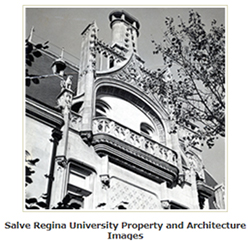 The Archives created a display marking the 70th anniversary of Salve Regina's opening. While the college was founded in 1934, the school did not have a campus to open for students until 1947. This new display highlights the first four years of the college, including student activities, religious celebrations, and photographs of the original buildings. The display is on the first floor of the library outside the Munroe Special Collections Room (109).
The Archives created a display marking the 70th anniversary of Salve Regina's opening. While the college was founded in 1934, the school did not have a campus to open for students until 1947. This new display highlights the first four years of the college, including student activities, religious celebrations, and photographs of the original buildings. The display is on the first floor of the library outside the Munroe Special Collections Room (109).
Recently the Salve Regina Newsbulletin, a newsletter published from the 1970s-1990s, was digitized and made available in Digital Commons.
A new finding aid was recently created for the Sister Mary Venard papers.
The Whitaker collection of LPs were rehoused. This collection is searchable through the library catalog, and accessible by contacting Archives and Special Collections for a listening appointment.
The Archives continued to add to its digital photograph collections. Each of these galleries contains over 1200 images: Property & Architecture images
and Archives photographs.
Salve Alumni and Faculty Tell Their Stories
by Allison Graves '18 (History & Film minor) and Allyse Zajac '18 (Secondary Education & History)
This summer we had the opportunity to meet and work with Salve’s alumni and faculty, beginning what we call the Salve Regina Oral History Project. The project was led by Dr. John Quinn of the History Department, and we were advised by Genna Duplisea, Salve Regina’s archivist. Most of our summer was spent interviewing ten of Salve’s finest and then transcribing those interviews for the project, which is made possible by the McGinty Fund.
The purpose of this endeavor was to create and establish a chronicle of campus and community life through their memories of life at Salve. Our participants included former and current faculty, two alumnae from the Class of 1962, and a retired staff member. We were both excited to begin our project, especially the interviews. Meeting with the alumni and faculty was definitely the most rewarding part of our experience. Everyone had wonderful stories to tell, whether it was a funny anecdote or a description of life on campus. It was amazing to learn how Salve has changed throughout its eighty years as an institution of higher education.
The interviews and written transcriptions will be available in the Salve Regina University Archives and online in the Digital Commons. The McGinty Fund was established in honor of the late John E. McGinty, and furthers the educational advancement of undergraduate students in history.
Makerspace & Second Floor Improvements
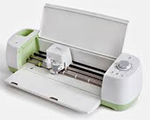 Located on the second floor, the library’s Makerspace is a campus creation space, with tools including a new Cricut die cutting machine, mechanical die cutter, laminator, glue gun, button maker, and presentation and craft supplies. The Makerspace is popular with students creating presentations, planning lessons for their student teaching assignments, or blowing off steam.
Located on the second floor, the library’s Makerspace is a campus creation space, with tools including a new Cricut die cutting machine, mechanical die cutter, laminator, glue gun, button maker, and presentation and craft supplies. The Makerspace is popular with students creating presentations, planning lessons for their student teaching assignments, or blowing off steam.
Special Programs Librarian Kiki Butler and Evening Circulation Supervisor Beth Blycker Koll also coordinate monthly Crafting in the Makerspace events, where students meet on a Sunday afternoon to learn how to use Makerspace tools and make a seasonal craft.
Also now available on the second floor are 8 new room dividers/rolling whiteboards.
|


From Dispossessed to Agents of Change: Participatory Culture in Icíar Bollaín’s In a Foreign Land
Library: Thurs. Sept. 21, at 4:00 p.m.
 Please join us as Dr. Esther Alarcòn-Arana, assistant professor of modern and classical languages, shares her research on Bollaìn’s In a Foreign Land.
Please join us as Dr. Esther Alarcòn-Arana, assistant professor of modern and classical languages, shares her research on Bollaìn’s In a Foreign Land.
Read more...

Blind Date with a Banned Book
Miley Lobby: Mon. Sept. 25, 11:00 a.m. – 1:00 p.m.
As part of the American Library Association’s Banned Books Week, librarians from McKillop Library will be checking out banned books in Miley Lobby. The books are wrapped, leaving participants with only the reasons why the book was banned to choose which book to check out. This is a first year Navigator event.
Read more...
Dirty Pictures? Gender, Sexuality, and the Censorship of Books
Library: Wed. Sept. 27, 1:00 – 2:15 p.m.
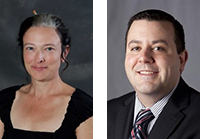
Join Dr. Anthony Mangieri and Professor Susannah Strong in a discussion about censorship, art, and illustration as they discuss books such as R.Crumb's Genesis and others.
Read more...
Salve Regina ArtsSlam
Wakehurst Rose Garden: Wed. Sept. 27, 4:00 p.m. – 6:00p.m.
Join Salve Regina dance, music, poetry and other performing arts students as they explore the meaning of freedom of expression through performing arts.
Predatory Journals Workshop
Library 106: Wed. Oct. 25, 4:00 – 5:00 p.m.
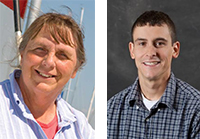 In honor of Open Access Week in October, Dr. Thomas Arruda and librarian Olga Verbeek will be hosting a workshop to help the Salve community identify predatory publishers and avoid submitting their work to questionable journals.
In honor of Open Access Week in October, Dr. Thomas Arruda and librarian Olga Verbeek will be hosting a workshop to help the Salve community identify predatory publishers and avoid submitting their work to questionable journals.
Read more...

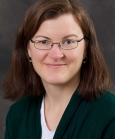 Ingrid Levin, previously research & instruction librarian, moved to a new position as collections services librarian. Ingrid Levin, previously research & instruction librarian, moved to a new position as collections services librarian.
 Nancy Barta-Norton joined the library as collections services associate. Nancy Barta-Norton joined the library as collections services associate.
Lisa Underhill, former collections services associate, left the library to begin a new career.
Sue Small, previously curriculum resources librarian, left her library position to accept a new position in the Education Department.
John Lewis, previously collections services librarian, left his position to accept a new teaching position.

Recreational Reading and DVDs
Located on the first floor, the library’s browsing collection includes recent bestselling fiction and non-fiction, with a variety of mysteries, novels, thrillers, memoirs, biographies, and books on current events. Readers can also find recreational reading on the third floor in the literature section, with many new works of contemporary American and worldwide literature added to the collection each year.
For movie fans, our DVD collection is constantly growing, with over 7,000 new DVDs added last year. More feature films and foreign films can be found online in our streaming video database Kanopy.

|
|

